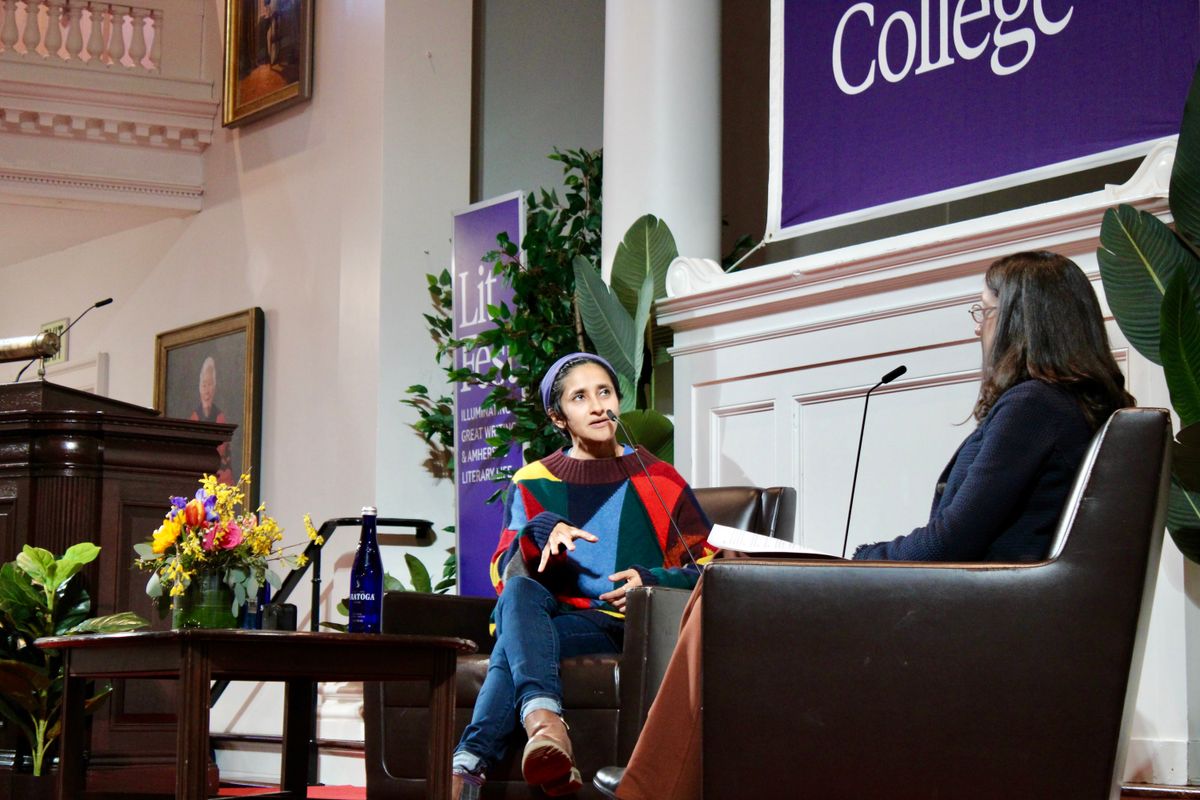Aparna Nancherla ’05 Brings Laughs to LitFest
Comedian, actor, writer, and podcast host Aparna Nancherla ’05 visited the college during LitFest 2024 to discuss her recent book “Unreliable Narrator.” Mila Massaki Gomes ’27 recounts the conversation and Nancherla’s journey as a writer.

On Feb. 25, LitFest hosted Aparna Nancherla ’05 in conversation with Jennifer Acker ’00. Acker welcomed the comedian, actor, writer, and podcast host to the Johnson Chapel stage with warm remarks that outlined some of Nancherla’s work since graduating from Amherst. From a voice role on the Netflix comedy show “Bojack Horseman” to taking on standup comedy and starting her podcast “The Introvert’s Survival Guide,” Nancherla shared a snapshot into her experience as a growing artist and how imposter syndrome led her to write her first book, “Unreliable Narrator.”
As a first-generation immigrant and self-described shy person, Nancherla explained that her relationship with imposter syndrome was something close to life-long. Describing herself as “an observer on the sidelines,” the writer, in a light and comedic tone, talked about how receiving a new opportunity or landing a job never came with a feeling of accomplishment but rather a question of “Why me?” Acker asked Nacherla if being a psychology major helped her identify imposter syndrome in herself. The comedian responded by explaining the meta-implications of self-diagnosing the ailment: “Sure, other people can have imposter syndrome, but not me. No, I’m actually bad.”
Nancherla wasn’t born a stand-up comedian, she explained. In fact, her ability to speak in public (and, later, love for comedy) came from a place of fear. As an introverted immigrant child, Nancherla’s circumstances often worried her mother, who feared she’d have trouble “finding a space for herself in the world.” As a remedy, her mother posed exercises to build Nancherla’s confidence as she grew up, ranging from ordering pizza over the phone to attending public speaking lessons and competitions. In one of these public speaking competitions, Nancherla discovered her love for comedy. While every other competitor took a serious approach to the topic — “Asian discrimination in America,” Nancherla found a space to express her frustrations towards Bollywood movies comically. The crowd was enthralled, and her new passion started to grow.
Indeed, as an introvert, taking the stage — a social and “less conventional” discipline — couldn’t have been easy. Still, Nancherla was happy to explain how so much of her joy and comfort was found in acting and making others laugh. “Talking to someone one-on-one always felt harder,” she explained. “Getting my thoughts organized and accepting that that was how I was naturally perceived seemed harder than being on stage.” For Nancherla, the stage is a “controlled environment,” a place she can present what she wants and prepare beforehand. Nancherla’s success in the entertainment industry came from a certain necessity and inevitability. She looked at her peers entering the finance industry and knew it wasn’t for her; “iBanking?” she joked, “I didn’t even know what the ‘i’ in iBanking stood for.”
As Nancherla’s career developed, so did the content of her writing. With more confidence and experience, her comedy sets began to veer from topics she thought the audience expected and toward her mental health. She opened up about suffering from anxiety and depression and how, when it felt like there was simply nothing else she could write or joke about, she transformed her struggles into a part of her work. This is also manifested in “Unreliable Narrator,” Nancherla’s memoir and debut book.
Though it is undeniably terrifying to joke about and communicate these personal and sensitive topics, Nancherla found that her writing resonated with people. And even though some editors and critics had told her to leave mental health topics behind, often describing them as “too dark” and even “depressing,” the comedian set her foot down and kept pushing to talk, and ultimately joke, about the issues that were an integral part of her life: “If I can make people laugh about it,” she explained, “then why wouldn’t I?”
Acker suggested that perhaps writing “Unreliable Narrator” “cured” Nancherla’s struggles. The writer explained that the process of creating the book felt more like opening “Pandora’s Box” and experiencing some “meta-imposter syndrome.” Unlike a stand-up show, Nancherla described, writing the book wasn’t “linear” and that felt foreign compared to her process of planning shows and bits. With “loose ends, many beginnings, and open starts,” “Unreliable Narrator” successfully shows the messiness of the human mind and experience. Including hilarious features, such as a “Failure Resume,” where the author finds a funny way to come to terms with rejection, and her relatable and enthralling voice, the memoir is a comforting reminder that our lives don’t have to be perfectly structured, nor do they have to aim for just one resolution.
As an Amherst student and young writer, Nancherla’s work is more than soothing. It is a reminder that self-doubt comes to all of us, even those who look like they are at the top of the world. “Unreliable Narrator” is a lesson to us all, a reminder to embrace the ambiguity of life as we follow our dreams and understand that maybe (just maybe) we aren’t imposters at all.





Comments ()